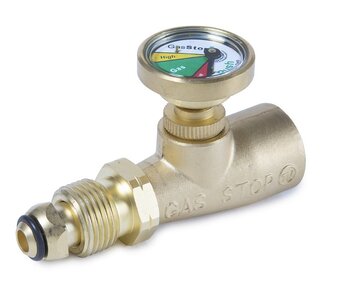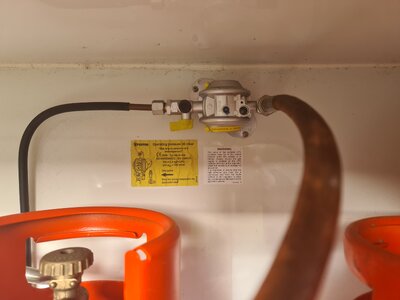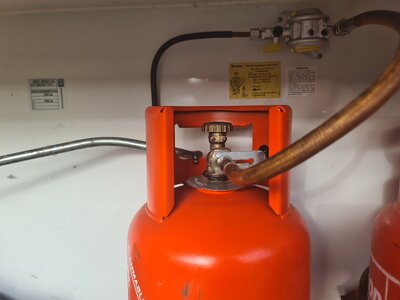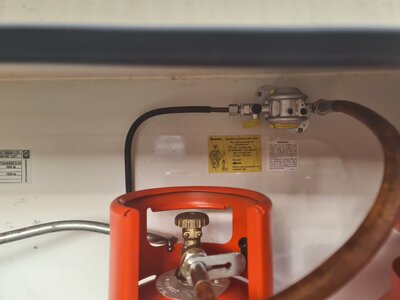Gas safe
- Thread starter Yellows11
- Start date
You are using an out of date browser. It may not display this or other websites correctly.
You should upgrade or use an alternative browser.
You should upgrade or use an alternative browser.
- Nov 11, 2009
- 26,046
- 9,667
- 50,935
Sorry not familiar with what you are describing. Do you mean the caravan gas regulator, or gas shut off valve to isolate internal appliances. A link to what you have been reading would help.I been reading about the gas safe valve is it worth buying and is it easy to fit?
The chances of a hose rupturing is very small and usually they go when pressure is first applied i.e. when you are there , so IMO it's really not necessary and if a gas pipe downstream of the regulator fails , the regulator will limit the flow and it is unlikely to trigger the unit. A pressure gauge is more susceptible to failure. So you are introducing another potential leakage point( joint and gauge).The gas locker is designed so that in the event of a gas leak , there are no sources of ignition in it ( unless you insert one, gas torch , camping lantern spare battery e.t.c) and the gas drops allow the escaped gas to dissipate. I got one as I have to perform letby testing and 1/3 of Calor gas bottle valves leak, so I thought I could isolate the bottle , but only a rush of gas will switch it off , you can only reset by pressing the pressure gauge , so it sits in my gas equipment toolbox gathering dust.
In respect to knowing the LPG quantity left a pressure gauge based indication is near useless as the pressure depends on draw off demands, product temperature and product's state, liquid or gas, some of which can be dynamic.
So as stated why in trying to make things safer introduce additional risk for little of use info?
So as stated why in trying to make things safer introduce additional risk for little of use info?
- Nov 30, 2022
- 2,021
- 1,930
- 5,935
A solution looking for a highly unlikely/improbable issue that doesn't need fixing.
Caravans and motorhomes have survived for many decades without such a device.
Well thats my opinion for what it's worth.
Caravans and motorhomes have survived for many decades without such a device.
Well thats my opinion for what it's worth.
- Jun 20, 2005
- 20,438
- 5,585
- 50,935
Absolutely👍. Why ? For the sake of a few kilos pay load we still carry two 6kg Cylinders. When one runs out……….A solution looking for a highly unlikely/improbable issue that doesn't need fixing.
Caravans and motorhomes have survived for many decades without such a device.
Well thats my opinion for what it's worth.
- Nov 30, 2022
- 2,021
- 1,930
- 5,935
The post isn't about auto changeover valves, it's about a valve that shuts off the gas supply in the event of a catastrophic leak.Absolutely👍. Why ? For the sake of a few kilos pay load we still carry two 6kg Cylinders. When one runs out……….
- Jun 20, 2005
- 20,438
- 5,585
- 50,935
Yes but it also has a guageThe post isn't about auto changeover valves, it's about a valve that shuts off the gas supply in the event of a catastrophic leak.
- Mar 14, 2005
- 19,278
- 4,473
- 50,935
I'm inclined to agree with IanB's assessment of the situation. When you look at the risk profile of a caravan LPG system, the vast majority of the system is is made from solid copper and brass items. These are inherently strong and long lasting and as such th erisk of burst failure is very very small. The most vulnerable parts are the pigtails between the gas cylinder and the regulator and the regulators internal diaphragm, but considering the usage case, these are all quite well protected inside the gas cylinder locker and are unlikely to be snagged when towing.
Of course whilst towing the gas bottles should be turned off at the valve on the bottle anyway.
Again as IanB points out, by introducing the device into the system, you are actually introducing another potential failure point. And you also need to consider how to check your safety device safely.
There can be a value to a pressure gauge if you understand how an LPG cylinder works, becasue as has again be stated the actual bottle pressure is determined by the type of gas you are using (liquefied Propane temperature and pressure coefficient is very different to Butane ) and will vary with the temperature of the vapour fill in the cylinder. In practice a pressure gauge tells you nothing about how full a cylinder is with LPG, as long as there is some liquefied content in th e cylinder the vapour pressure is solely determined by the temperature of the cylinder, the gauge will only really show a reducing pressure when all the liquified content has boiled off to vapour and it is used up.
I'm sure there are situations where such a device has some real safety purpose, and whilst it won't harm your system, I can't see it providing any real safety value to a touring caravan.
Just follow normal caravanning good practice of ensuring your gas cylinder valve is properly turned of when ever traveling.
This is an example of a solution searching for a problem and I rate it alongside Tyre bands which is a whole separate debate.
Of course whilst towing the gas bottles should be turned off at the valve on the bottle anyway.
Again as IanB points out, by introducing the device into the system, you are actually introducing another potential failure point. And you also need to consider how to check your safety device safely.
There can be a value to a pressure gauge if you understand how an LPG cylinder works, becasue as has again be stated the actual bottle pressure is determined by the type of gas you are using (liquefied Propane temperature and pressure coefficient is very different to Butane ) and will vary with the temperature of the vapour fill in the cylinder. In practice a pressure gauge tells you nothing about how full a cylinder is with LPG, as long as there is some liquefied content in th e cylinder the vapour pressure is solely determined by the temperature of the cylinder, the gauge will only really show a reducing pressure when all the liquified content has boiled off to vapour and it is used up.
I'm sure there are situations where such a device has some real safety purpose, and whilst it won't harm your system, I can't see it providing any real safety value to a touring caravan.
Just follow normal caravanning good practice of ensuring your gas cylinder valve is properly turned of when ever traveling.
This is an example of a solution searching for a problem and I rate it alongside Tyre bands which is a whole separate debate.
- Mar 14, 2005
- 19,278
- 4,473
- 50,935
I should also add that such device need to be sized correctly to the system theri being installed in. The trigger flow that causes the valve to close should be selected to be just higher than the peak demand of all installed applainces operating at the same time, other wise especially with the smaller 8mm copper pipe used in caravans, the pipes natural resistance to flow may limit the open flow rate and prevent the device from triggering.
PS
There is one potential use for such a device. Because it is located externally to the cylinder valve, it could be used as very coarse gas leak check. I stress it will be coarse becasue its on the HP side of the regulator and thus will take a long time to equalise the HP to the LP and show a small leak so its not a reliable check.
PS
There is one potential use for such a device. Because it is located externally to the cylinder valve, it could be used as very coarse gas leak check. I stress it will be coarse becasue its on the HP side of the regulator and thus will take a long time to equalise the HP to the LP and show a small leak so its not a reliable check.
Last edited:
TRENDING THREADS
-
-
-
-
Mandatory eye tests for drivers over 70 being proposed by HMG. Good or bad?
- Started by Dustydog
- Replies: 201
-
-
-

Practical Caravan is part of Future plc, an international media group and leading digital publisher. Visit our corporate site.
© Future Publishing Limited Quay House, The Ambury, Bath BA1 1UA. All rights reserved. England and Wales company registration number 2008885.




